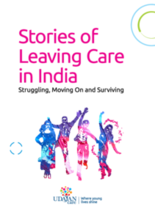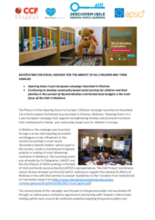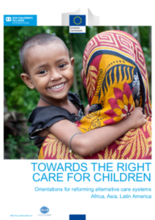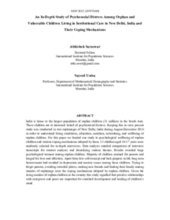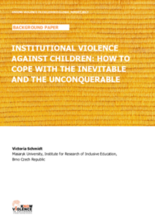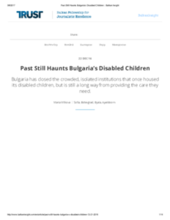Displaying 401 - 410 of 771
The case studies outlined in this publication draw upon earlier work, which suggested that young people leaving care may broadly fall into one of three groups: those successfully ‘moving on’ from care; those who are ‘survivors’; and those who are ‘strugglers’.
This report from Opening Doors discusses the Opening Doors II pan-European campaign launched in Chisinau.
This book presents the results of this research on more than 52,000 children placed in public care in Romania (in special protection) who receive family or residential-type protection services as well as on the children at risk of separation from their families from the source communities.
The Bulgaria Country Fact Sheet provides short details on the state of institutional care in Bulgaria.
This synthesis report contains findings of a study that conducted research in six South and Central American, Asian and African countries for the purpose of gaining understanding of the nature, extent, and scope of institutionalization and the feasibility of deinstitutionlisation.
This newsletter issue from Senator Linda Reynolds of Western Australia, written in conjunction with Kate van Doore of Griffith Law School, was written in preparation for the Australian Parliamentary inquiry on modern slavery and describes the ways in which orphanage trafficking constitutes modern-day slavery.
This study examined the psychological wellbeing of children in institutions and their various coping mechanisms.
This paper, produced for the Know Violence global learning initiative, looks at the violence children experience in closed institutions in the Central Asian countries, specifically the former Soviet republics: Kazakhstan, Kyrgyzstan, Tajikistan and Uzbekistan.
This article discusses Bulgaria's challenges since the shut down of its crowded institutions, which housed disabled children.
As part of NOVA's look at childhood education, Dr. Charles Nelson came to this Boston Cafe Sci to share his research on the effects of early profound adversity on child and brain development.

